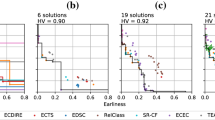Abstract
Analyzing better time series with limited human effort is of interest to academia and industry. Driven by business scenarios, we organized the first Automated Time Series Regression challenge (AutoSeries) for the WSDM Cup 2020. We present its design, analysis, and post-hoc experiments. The code submission requirement precluded participants from any manual intervention, testing automated machine learning capabilities of solutions, across many datasets, under hardware and time limitations. We prepared 10 datasets from diverse application domains (sales, power consumption, air quality, traffic, and parking), featuring missing data, mixed continuous and categorical variables, and various sampling rates. Each dataset was split into a training and a test sequence (which was streamed, allowing models to continuously adapt). The setting of “time series regression”, differs from classical forecasting in that covariates at the present time are known. Great strides were made by participants to tackle this AutoSeries problem, as demonstrated by the jump in performance from the sample submission, and post-hoc comparisons with AutoGluon. Simple yet effective methods were used, based on feature engineering, LightGBM, and random search hyper-parameter tuning, addressing all aspects of the challenge. Our post-hoc analyses revealed that providing additional time did not yield significant improvements. The winners’ code was open-sourced (https://www.4paradigm.com/competition/autoseries2020).
Access this chapter
Tax calculation will be finalised at checkout
Purchases are for personal use only
Similar content being viewed by others
Notes
- 1.
- 2.
- 3.
- 4.
- 5.
- 6.
- 7.
- 8.
In some application domains (not considered in this paper), even future \( \{ t+1, \cdots , t+t_{max} \}\)) values of the covariates may be considered. An example would be “simultaneous translation” with a small lag.
- 9.
- 10.
- 11.
- 12.
- 13.
- 14.
References
Alexandrov, A., et al.: GluonTS: probabilistic and neural time series modeling in Python. J. Mach. Learn. Res. 21(116), 1–6 (2020)
Erickson, N., et al.: AutoGluon-tabular: robust and accurate AutoML for structured data (2020)
Hutter, F., Kotthoff, L., Vanschoren, J. (eds.): Automated Machine Learning. Methods, Systems, Challenges. The Springer Series on Challenges in Machine Learning. Springer, Cham (2019). https://doi.org/10.1007/978-3-030-05318-5
Hyndman, R.J., Athanasopoulos, G. (eds.): Forecasting: principles and practice. OTexts (2021). https://otexts.com/fpp3/. Accessed 25 Mar 2021
Jin, H., Song, Q., Hu, X.: Auto-Keras: an efficient neural architecture search system. In: KDD (2019)
Kanter, J.M., Veeramachaneni, K.: Deep feature synthesis: towards automating data science endeavors. In: IEEE International Conference on Data Science and Advanced Analytics, DSAA (2015)
Ke, G., et al.: LightGBM: a highly efficient gradient boosting decision tree. In: Advances in Neural Information Processing Systems (2017)
Lai, G., Chang, W., Yang, Y., Liu, H.: Modeling long- and short-term temporal patterns with deep neural networks. In: SIGIR (2018)
Lim, B., Zohren, S.: Time series forecasting with deep learning: a survey (2020)
Liu, Z., et al.: Towards automated computer vision: analysis of the AutoCV challenges 2019. Pattern Recogn. Lett. 135, 196–203 (2020)
Tan, C.W., Bergmeir, C., Petitjean, F., Webb, G.I.: Time series extrinsic regression. Data Min. Knowl. Disc. 35(3), 1032–1060 (2021). https://doi.org/10.1007/s10618-021-00745-9
Taylor, S.J., Letham, B.: Forecasting at scale. PeerJ Prepr. 5, e3190v2 (2017)
Wang, L., Chen, J., Marathe, M.: DEFSI: deep learning based epidemic forecasting with synthetic information. In: AAAI (2019)
Wang, Z., Yan, W., Oates, T.: Time series classification from scratch with deep neural networks: a strong baseline. In: International Joint Conference on Neural Networks (2017)
Yao, Q., et al.: Taking human out of learning applications: a survey on automated machine learning (2018)
Author information
Authors and Affiliations
Corresponding author
Editor information
Editors and Affiliations
Rights and permissions
Copyright information
© 2021 Springer Nature Switzerland AG
About this paper
Cite this paper
Xu, Z., Tu, WW., Guyon, I. (2021). AutoML Meets Time Series Regression Design and Analysis of the AutoSeries Challenge. In: Dong, Y., Kourtellis, N., Hammer, B., Lozano, J.A. (eds) Machine Learning and Knowledge Discovery in Databases. Applied Data Science Track. ECML PKDD 2021. Lecture Notes in Computer Science(), vol 12979. Springer, Cham. https://doi.org/10.1007/978-3-030-86517-7_3
Download citation
DOI: https://doi.org/10.1007/978-3-030-86517-7_3
Published:
Publisher Name: Springer, Cham
Print ISBN: 978-3-030-86516-0
Online ISBN: 978-3-030-86517-7
eBook Packages: Computer ScienceComputer Science (R0)





